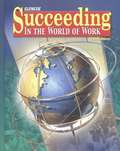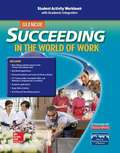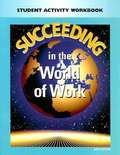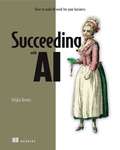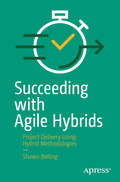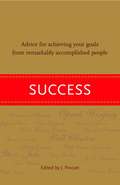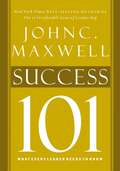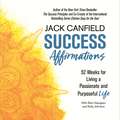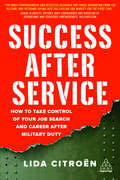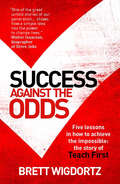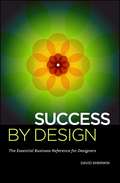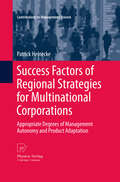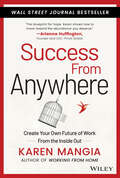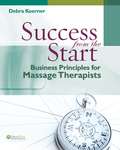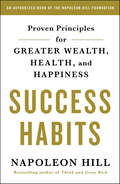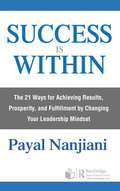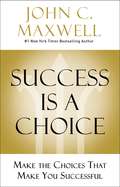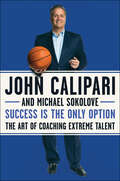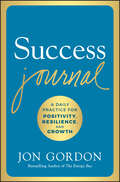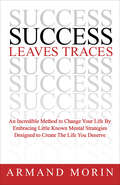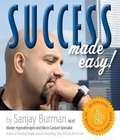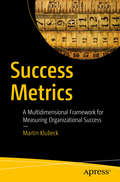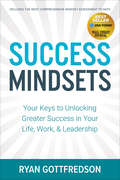- Table View
- List View
Succeeding in the World of Work (7th edition)
by Grady Kimbrell Ben S. VineyardThis updated and comprehensive program prepares students for the complex issues they'll face in the rapidly changing workplace.
Succeeding in the World of Work: Student Activity Workbook
by Glencoe McGraw-Hill StaffIncludes: note-taking activities based on the Cornell note-taking model, real-world applications, personal academic and career portfolio activities, 21st century skills, foundation skills, and workplace competencies correlations, academic applications, study skills activities, test-prep and test-taking practice.
Succeeding in the World of Work: Student Activity Workbook (6th Edition)
by Grady Kimbrell Ben S. VineyardSucceeding In The World Of Work Student Activity Workbook for High School Students
Succeeding with AI: How to make AI work for your business
by Veljko KrunicSummary Companies small and large are initiating AI projects, investing vast sums of money on software, developers, and data scientists. Too often, these AI projects focus on technology at the expense of actionable or tangible business results, resulting in scattershot results and wasted investment. Succeeding with AI sets out a blueprint for AI projects to ensure they are predictable, successful, and profitable. It&’s filled with practical techniques for running data science programs that ensure they&’re cost effective and focused on the right business goals. Purchase of the print book includes a free eBook in PDF, Kindle, and ePub formats from Manning Publications. About the technology Succeeding with AI requires talent, tools, and money. So why do many well-funded, state-of-the-art projects fail to deliver meaningful business value? Because talent, tools, and money aren&’t enough: You also need to know how to ask the right questions. In this unique book, AI consultant Veljko Krunic reveals a tested process to start AI projects right, so you&’ll get the results you want. About the book Succeeding with AI sets out a framework for planning and running cost-effective, reliable AI projects that produce real business results. This practical guide reveals secrets forged during the author&’s experience with dozens of startups, established businesses, and Fortune 500 giants that will help you establish meaningful, achievable goals. In it you&’ll master a repeatable process to maximize the return on data-scientist hours and learn to implement effectiveness metrics for keeping projects on track and resistant to calcification. What's inside Where to invest for maximum payoff How AI projects are different from other software projects Catching early warnings in time to correct course Exercises and examples based on real-world business dilemmas About the reader For project and business leadership, result-focused data scientists, and engineering teams. No AI knowledge required. About the author Veljko Krunic is a data science consultant, has a computer science PhD, and is a certified Six Sigma Master Black Belt. Table of Contents: 1. Introduction 2. How to use AI in your business 3. Choosing your first AI project 4. Linking business and technology 5. What is an ML pipeline, and how does it affect an AI project? 6. Analyzing an ML pipeline 7. Guiding an AI project to success 8. AI trends that may affect you
Succeeding with Agile Hybrids: Project Delivery Using Hybrid Methodologies
by Shawn BellingSuccessfully delivering projects at an organization can happen with the careful utilization of a variety of methods and practices. The best approach is a hybrid framework that adapts in real time to your team and its needs. This book addresses the practical realities of project delivery in the 21st century. The agile method is well-known and well-covered. Author Shawn Belling dives deeper with his expertise into organizational management and investigates how to best execute a graceful mix of waterfall methods, agile, and phase-based approaches. Each business and goal requires flexibility for a unique journey to success, and Belling provides the practitioner with practical, real-world examples and patterns of these methodologies. Succeeding with Agile Hybrids is the answer to the diversity of needs within your team. Whether you are an aspiring or current project manager, scrum master, or mid-level manager, this book will greatly benefit you and your goals for project delivery. Hybrid agile is the future, and you will be well-equipped to tackle it with Succeeding with Agile Hybrids on your shelf.What You'll LearnSee how hybrid agile is a common de facto approach to project managementReview common, practical and real-world examples and patterns of hybrid agile project managementEvaluate projects and organizations for using hybrid agile or agile project managementWho This Book is ForAspiring or current project managers, scrum masters, or mid-level managers with responsibility for projects or professional services delivery in a technical field. Executive leaders, academic and training programs may also pick this book as a text.
Succeeding with Senior Management: Getting the Right Support at the Right Time for Your Project
by G. Michael CampbellSenior managers speak the language of strategy. Project managers use the language of tasks and activities. While they rely on each other to achieve their goals, this core incompatibly can lead to communication breakdowns and project setbacks.Succeeding with Senior Management explains how to bridge the gap and engage the upper ranks. By establishing relationships early on, understanding executives, and keeping them involved, project managers win the support they need—especially critical when problems arise. This one-of-a-kind communications guide explains how to:Navigate the company?s political watersLink the project to the businessDevelop a case for change with an executive sponsorUse the right listening styleProvide options and recommendations for major decisionsInvolve the sponsor in resolving cross-functional problemsAnd moreMany executives will set a project in motion and then move on. Learn how to keep them involved, motivated to push obstacles aside, and focused on a successful conclusion. Your career prospects depend on it.
Success
by J. PincottHow did Hillary Clinton, Michael Bloomberg, Jeffrey Bezos, David Sedaris, and Macy Gray get where they are today - and how can you get the same edge?Success is a collection of insights from more than 400 remarkably successful people in all fields - including business, politics, entertainment, and the arts. Here are quotes and passages from J.K. Rowling and Federico Fellini on getting started, and Steve Jobs and Tiger Woods on passion. Here, too, are George Lucas and Bill Clinton on goals, Katie Couric and George Foreman on competition, and Edmund Hillary and Carly Fiorina on leadership.The high achievers quoted here share one crucial belief: Success is possible as long as there's passion. If you know where you want to be but not how to get there, use Success as your guide.From the Hardcover edition.
Success 101: What Every Leader Needs To Know
by John MaxwellThe Bottom Line on Success Most of us are eager to achieve success in life. But are we really sure what actions yield true, lasting success? Do you KNOW that you're taking steps in the right direction? Success is different for every person. But the principles for the journey don't change. In Success 101, John Maxwell distills success down to its essential components. In this short and easy-to-read volume, he shows you exactly what success looks like. He also offers specific steps you can take and ways you can overcome obstacles that might otherwise keep you from achieving success. Success breeds success--in you, in those closest to you, and in everyone you lead.
Success Affirmations: 52 Weeks for Living a Passionate and Purposeful Life
by Jack Canfield'Jack has been inspiring people to live their best lives for decades' Oprah WinfreyBestselling author of CHICKEN SOUP FOR THE SOUL will guide you through to new levels of passion, purpose and prosperity, with 52 affirmations and time-tested wisdom.'One of the Most Influential Leaders in Personal Growth and Achievement' SUCCESS MagazineIn our 24/7 world, sometimes we let life happen to us instead of taking control of our direction. Other times, we suffer from information overload, and we fail to consciously control our positive thoughts, and we allow negativity to take over. Jack Canfield will show you how positive affirmations can transform your life in extraordinary ways. Success Affirmations reveals:How to avoid letting life just happen to you, and how to proactively go after your dreamsHow to use the power of deliberate thought to create the reality you wantHow to identify your true passions and purpose to direct your affirmations to concrete goalsHow to harness positive energy to attract what you want in your life through the Law of AttractionHow to unplug from technology and plug into your true source of energyAnd much more!
Success Affirmations: 52 Weeks for Living a Passionate and Purposeful Life
by Jack Canfield'Jack has been inspiring people to live their best lives for decades' Oprah WinfreyBestselling author of CHICKEN SOUP FOR THE SOUL will guide you through to new levels of passion, purpose and prosperity, with 52 affirmations and time-tested wisdom.'One of the Most Influential Leaders in Personal Growth and Achievement' SUCCESS MagazineIn our 24/7 world, sometimes we let life happen to us instead of taking control of our direction. Other times, we suffer from information overload, and we fail to consciously control our positive thoughts, and we allow negativity to take over. Jack Canfield will show you how positive affirmations can transform your life in extraordinary ways. Success Affirmations reveals:How to avoid letting life just happen to you, and how to proactively go after your dreamsHow to use the power of deliberate thought to create the reality you wantHow to identify your true passions and purpose to direct your affirmations to concrete goalsHow to harness positive energy to attract what you want in your life through the Law of AttractionHow to unplug from technology and plug into your true source of energyAnd much more!Written and read by Jack Canfield(p) Blackstone Audio 2018
Success After Service: How to Take Control of Your Job Search and Career After Military Duty
by Lida CitroënFiguring out your next move after transitioning out of the military should start before your last day. Prepare yourself emotionally and professionally to put those hard-earned skills in context of the civilian world.The transition from military to civilian life is more than just a title change; it is a whole new life experience with the sense of excitement and possibility that accompany a transition. Whether you're preparing to retire or separate, Success After Service is written to help all veterans succeed in the civilian workplace. Success After Service provides the tools, resources and strategies to help you adapt to the civilian workplace and evaluate post-military career options. Whether you become an entrepreneur, move into the corporate world or pursue higher education, you will learn how to develop a portfolio of career assets, including your résumé, elevator pitch, online profiles, interview acumen and professional network, empowering you to begin your new career with confidence and clarity. Success After Service is the perfect guide for transitioning military and veterans who seek a coherent set of strategies, resources and steps for building a meaningful, deliberate and rewarding post-military career.
Success Against the Odds: Five Lessons in How to Achieve the Impossible: the Story of Teach First
by Brett WigdortzThis is the story of how a tiny independent charity has succeeded against all odds. Having met nothing but resistance in its early years, Teach First is today Britain's largest employer of graduates. It receives over 7000 applications for 1000 teaching positions annually in the most challenging schools in the country.
Success By Design: The Essential Business Reference for Designers
by David SherwinWant to make your design business a success? Start here.Fellow Designer,In your career you may have been like me: Trying to keep projects on the rails and clients happy. Digging through blogs for useful advice. Wondering if there was a better way to handle all of the demands of being a design professional and running a creative business.The wisdom contained in Success By Design: The Essential Business Reference for Designers will help you become a stronger businessperson and better plan your career path as a design leader. This book was born from in-depth interviews with a slew of successful designers, studio directors, project managers, and client service professionals across a wide range of creative industries.It contains the business secrets I needed the most when I started as a designer sixteen years ago.--David
Success Factors of Regional Strategies for Multinational Corporations: Appropriate Degrees of Management Autonomy and Product Adaptation
by Patrick HeineckeThis work examines the factors that drive the success of Multinational Corporations (MNCs) in their pursuit of regional strategies. The author develops a comprehensive regional success factor model, by which the effects of regional management autonomy and regional product and service adaptation on the regional success of MNCs as well as the interaction effects of regional orientation and inter-regional distance are investigated. The model is evaluated by means of the partial-least-squares (PLS) method on the basis of a survey-based inquiry of the Fortune Global 500 firms with success indicator data for a period of nine years. The findings highlight the importance of considering the different degrees of contextual influence in the design of regional strategies, where low degrees of regional management autonomy and high levels of regional product/service adaptation are found to be appropriate for MNCs to be regionally successful.
Success From Anywhere: Create Your Own Future of Work from the Inside Out
by Karen MangiaWhat would happen to your team, and your organization, if everyone knew how to change the game – and make success a daily occurrence? Companies and individuals are looking for more freedom: personal freedom, creative freedom, and freedom to rethink what work really means. From dealing with COVID-19, facing diversity issues, battling burnout, zoom fatigue and more, organizations are stretched thin and must find a way to help their employees find balance and freedom in order to thrive in these unprecedented times. In Success From Anywhere: Create Your Own Future of Work from the Inside Out, bestselling author and veteran Salesforce executive Karen Mangia delivers an eyes-wide-open discussion on the future of work and what it means to find personal and professional success in the new workforce. Whether you’re in a hybrid environment, or working from home, you know the importance of connection and teamwork. This compelling, practical guide explains how success is something organizations discover from the inside out – creating greater engagement, retention, and professional impact from a new understanding of the future of work. With commentary from business leaders like Tom Peters, as well as guidance from leading scientists like David Eagleman and Kelly McGonigal, Success From Anywhere shows professionals how to build success into every organizational design – regardless of company culture, leadership, or industry – and offers actionable insights on a range of timely and relevant subjects, including: Rethinking the foundations of what work really means, including work-life balance, the future of work, and where peak performance really comes from The origins of intolerance, and how to access greater diversity, inclusion, and belonging inside every organization Creating a high-impact culture in the anxious and stressful pandemic environment by redesigning the game – and creating your own rules How to overcome feelings of constriction and confinement, to find new possibilities, for your own career Getting past the feeling that you have to “do it all” in order to succeed Powerful scientific insights into stress-relief, battling burnout and becoming your best self Perfect for anyone wanting to create greater professional impact, whether working from home, leading a hybrid team, or just trying to access greater personal freedom, this principles-based guidebook will earn a spot in the libraries of executives, managers, leaders, and employees who care about creating innovative and inclusive organizations. Discover how to adapt to these changing times and the uncertain times ahead with a new playbook for yourself, your career, and your organization – that playbook is Success From Anywhere.
Success From The Start: Business Principles For Massage Therapists
by Debra Koerner"Whether you are a current student at a massage school or a seasoned practitioner that is imagining a deeper understanding of your career--I wrote this book in hope of assisting you on your personal journey. " --Debra Koerner Rely on Success from the Start for the inspiration and practical business guidance you need to enjoy a long and rewarding career in massage therapy. Business naiveté is one of the primary reasons massage therapists leave the profession. The author has written this text to provide you with the business skills you need to envision and then launch a successful career. Set yourself on your path to success--right from the start. Whether you choose to be an employee, independent contractor, or business owner, this practical text will guide you every step of the way! Exercises and worksheets throughout will help you explore and better understand your intentions as a therapist. After crafting a vision and defining your personal success, you'll establish the business and financial foundation you need to meet your goals. From professionalism and business ethics, to money matters, business planning, and marketing techniques, you'll find all of the depth and detail you need--more than in most business texts. What's more, this is the only book that defines a systematic approach to creating a flawless client experience. Positive massage experiences lead to client loyalty which, in turn, generates the referrals and word-of-mouth buzz crucial to maintaining and growing your practice. The author walks you through all the important steps to follow when interacting with your clients. "When I reviewed the business books available for practitioners, I felt many supported skill building only from an entrepreneurial perspective. But, I saw a need to offer advice for therapists who want to be successful as employees and independent contractors. This text fills that gap by offering a comprehensive look at what a successful career as a massage therapist can be, whatever career path is chosen. " --Debra Koerner Nervous about writing your own business plan? No worries! Success from the Start guides you step by step as you complete your own plan. Access a FREE template online at DavisPlus. Your individual gifts and talents are needed, now more than ever, by the millions of people who rely on massage and bodywork as a vital part of their health and well-being. Ensure your career longevity by developing a solid understanding of the world of business.
Success Habits: Proven Principles for Greater Wealth, Health, and Happiness
by Napoleon HillNever-before-published wisdom from famed self-help author Napoleon Hill Napoleon Hill, the legendary author of the classic best seller Think and Grow Rich, has been immortalized for his contributions to the self-help genre. In this never-before-published work Hill shares his principles of success, key habits that provide the basis for life-changing success. Success Habits explains the fundamental rules that lead to a prosperous life. From the importance of having Definiteness of Purpose to the inexorable influence of the Cosmic Habit Force, Hill’s principles offer a new way of thinking about intention, self-discipline, and the way we lead our lives. Originally a series of radio talks delivered in Paris, Missouri, Success Habits is filled with personal anecdotes and stories and is written in an approachable, conversational style. Hill’s insights apply to every facet of life, inspiring readers to leverage his principles to achieve their own aspirations and create the successful lives they have always dreamed of.
Success Is Within: The 21 Ways for Achieving Results, Prosperity, and Fulfillment by Changing Your Leadership Mindset
by Payal Nanjiani"Payal has beautifully defined success as to ‘reach where you want from where you are.’ She emphasizes rightful karma or focused execution to keep you on the right path so that you are always walking in a direction that takes you toward your goal." Dr. Arun Arora, CEO, EDVANCE "This book is full of practical tips on how to become a successful leader and the best part is Payal has narrated it wonderfully with appropriate fables and relevant case studies…. Her entrepreneurial attitude and impactful wisdom are commendable and evident in the IPL series." Swapna Hari, Director, Cognizant "This book by Payal Nanjiani will join the best of business literature for emphasizing attitude as our biggest asset." Swami Mukundananda of Jagadguru Kripaluji Yog (JKYog) Institute Gathering insights from 20 years of the author’s executive coaching in the United States and abroad, this book presents 21 mindfulness strategies for business leaders, corporate heads, entrepreneurs, and professionals. During the author’s coaching sessions for business and corporate leaders and her trainings at corporations, mid-sized businesses, small businesses, and start-up organizations, she discovered that there is a wide gap between those who achieve success and those who do not. This gap indicates that there is still something significant missing in the business world. Success Is Within fills this gap by encouraging business professionals to "mind the mind." Written in accessible, easy-to-digest language, and targeted towards busy US business professionals who long for thought-leadership to boost their success, the book argues that success depends on changing one’s mindset in key ways. Each chapter focuses on one way to transform one’s mindset to achieve success. The union of these 21 ways provides a uniquely comprehensive program for leadership success in business and corporate careers. Drawing from a blend of Eastern and Western wisdom, the book blends true-life storytelling about the challenges of actual business professionals with insights drawn from traditional parables from classic "wisdom books" to inspire readers to think-through how to transform their mindsets. Ultimately, the book helps magnify one’s inner power: the power of one’s mind. The book calls on business professionals to unleash their "inner leader." When they recognize the power of their inner leader, they will become unstoppable.
Success Is a Choice: Make the Choices that Make You Successful
by John C. MaxwellAre you tired of not reaching your full potential? Do you feel you have the talent to succeed but are unappreciated and trapped?Based on his New York Time bestselling book, Beyond Talent, John Maxwell asks if you are tired of not reaching your full potential and feel you have the talent to succeed but are unappreciated and trapped. If this describes you, in Success Is a Choice, you can learn the right choices that lead to success from John Maxwell, the go-to-guru for business professionals across the globe. Take the next steps that successful people chose, including:Believing in themselvesFiring up their passionInitiating actionFocusing their energyCultivating good relationshipsEmbracing PracticeThe choices you make in addition to your talent make the greatest difference. With authentic examples and time-tested wisdom, Maxwell shares fourteen choices you need to make to live the life of your dreams. It&’s time to go beyond talent by making right choices that will help you really stand out.
Success Is the Only Option: The Art of Coaching Extreme Talent
by John Calipari Michael SokoloveKentucky’s charismatic coach shares the secrets of creating one of the premiere programs in college basketball, revealing how he transforms a group of former high school superstars into selfless, cohesive teams—including a remarkable squad last year that fell just one game short of a perfect season.Kentucky basketball coach John Calipari is known for his unparalleled ability to recruit the nation’s best young players, some of whom will spend just one year with him before going to the NBA, and convincing them to commit to the team without sacrificing their personal goals. It is a promise he makes to them: "Fully invest in the present—and each other—and I guarantee it will serve your future." Here, for the first time, he distills his team-building methods in ways that apply to CEOs, business owners, coaches, teachers and leaders of all kinds—lessons for anyone seeking to inspire talented individuals to reach for their best selves and contribute to a greater good. A basketball team is an intimate workplace, in which blend is everything and character matters. As such, it is a window into the nature of successful leadership. Calipari views each new team like a startup business—one composed of new players, new relationships, and new challenges. Each season is a series of discoveries as he learns how to unleash the extreme talent in each of his players and mold them into championship material as college basketball comes to a crescendo every spring. While he can’t control everything, he is responsible for everything—just like a CEO.An enlightening look at leadership, management, and team building, Success Is the Only Option offers the keys to winning, on and off the court.
Success Journal: A Daily Practice for Positivity, Resilience, and Growth
by Jon GordonDaily journal to help you transform your life by structuring your thoughts around success Success Journal: A Daily Practice for Positivity, Resilience, and Growth is a daily, lined journal where readers can write down their success of the day, shift their nighttime focus from negativity to positivity, and thereby create more success and opportunities in their lives. This resource is inspired by the legendary Bart Connor, who credited his overcoming a torn bicep muscle to win two gold medals at the 1984 Olympics to his parents asking him about his success of the day as a child. Since hearing Bart Connor’s story, bestselling author and influencer Jon Gordon has helped spread his secret to success far and wide, starting with his own children and continuing on to tens of thousands attending his renowned keynote speeches. In this journal, readers will find: A structured, consistent way to transform your nighttime thoughts for the better All of the guidance you need to figure out the event(s) or accomplishment(s) in your day that made you smile Quotes related to positivity and success as a way to get the gears turning and the inspiration flowing Success Journal: A Daily Practice for Positivity, Resilience, and Growth is an essential daily journal for everyone looking to consistently shape their thoughts, and therefore their lives, around positivity and success.
Success Leaves Traces: An Incredible Method to Change Your Life By Embracing Little Known Mental Strategies Designed to Create The Life You Deserve
by Armand MorinTrue story from one of the world’s most successful Internet Marketers.Follow the steps that have led Armand to make millions of dollars. Learn to quickly and easily recognize great opportunities by using Armand’s Opportunity Matrix. Insights on how to think and perform like a millionaire. Discover the five elements necessary to accomplish anything in life. Success Leaves Traces is a way of re-engineering any task that anyone has ever done and make the process your own. Learn ways to get more out of a small team than most companies do with giant ones. How to gain focus and stay on task to accomplish all of your goals. Understand the “Stop Factor” and how to avoid it so it never stops you from moving forward again.
Success Made Easy
by Sanjay Burman8 Steps! 8 Exercises! 8 Weeks! A no-nonsense approach like never before! So what's your excuse? LIFE ISN'T HARD. We make it harder than it is. We can always find something to complain about! Yes, times are tough, but no tougher than before. It's our way of looking at things that have changed. Now I'm going to take you back to the basics. We are going to remove your fear of failure and even your fear of success! By the end of this audio book, if you dare to do all 8 exercises, I GUARANTEE that you will have far more success! This program has worked in many government organizations and corporations."
Success Metrics
by Martin KlubeckLearn how to measure success at the individual and organizational levels. By measuring success in multiple dimensions using multivariate methods you will be able to determine what works and what doesn't. The key is to measure and promote progress in terms of organizational vision, mission, and overarching goals. Business leaders too often succumb to the working assumption that they only have to show shareholders and boards of trustees that they are turning a profit--the higher the profit, the more successful their stewardship of the company. Wrong! To truly thrive and endure, all organizations--corporate, government, small, large, nonprofit, or startup--need to define and pursue the underlying purpose for their existence. To measure success, leaders today are missing a key meta-analytic in their toolbox. In this book, metrics consultant Martin Klubeck provides it to them. Success Metrics steps you through the process of identifying and combining the right measures to gauge, narrate, and guide your organization's progress toward true success. All organizations have a common goal to be successful. All leaders want to make data-informed decisions and use measures to improve processes, communicate progress, and gain support. The problem is that proxy or partial measures don't measure overall success and can be misleading. They measure performance parameters, progress on a specific task, customer feedback, and other piecemeal indices--which taken separately fail to describe an organization's progress toward overall success. The author's integrated measures of success can be used to communicate organizational progress to stakeholders, shareholders, boards of trustees, corporate leaders, the workforce, and the customer base and thereby galvanize broad commitment to organizational success. Klubeck shows how his principles and methods of measuring overall success can be applied at all levels: individual, team, group, department, division, and organization. What You Will Learn: Understand why you should measure success instead of performance Understand what to measure and what not to measure Integrate the measures of success to tell a complete story Share measures of success with different audiences Who This Book Is For Organizational leaders at all levels from the executive suite to middle management, analysts and consultants who are tasked with designing metrics programs for organizations, individuals interested in adapting the author's framework to measure overall personal success in multiple dimensions
Success Mindsets: Your Keys to Unlocking Greater Success in Your Life, Work, & Leadership
by Ryan GottfredsonSuccess Mindsets, written by Wall-Street Journal and USA Today Best-Seller Ryan Gottfredson, helps natural achievers, stalled professionals, and business executives unlock greater success in their life, work, and leadership. “Mindsets” is a word that is used quite frequently, however, many of those who use it are unaware that mindsets are foundational to and dictate one’s success in life, work, and leadership. They are also unable to identify specific mindsets that are necessary for success. Ryan Gottfredson has created a comprehensive and research-based guide, Success Mindsets, that is designed to awaken readers to:The power of mindsetsThe four mindsets they need to have to be successful The mindsets they currently possess through personal mindset assessment This awakening process empowers readers to unlock the greatness within themselves and reach the heights of success that they have been seeking but have thus far been unable to obtain. Within Success Mindsets, Ryan takes readers on a self-awakening journey to identify and unlock the four success mindsets necessary to enhance success across their life, work, and leadership.
